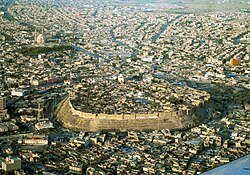Erbil
Arbil
ھەولێر / Hewlêr/Hawler (Kurdish) | |
|---|---|
 | |
| Country | |
| Governorate | Erbil |
| Government | |
| • Governor | Nawzad Hadi |
| Population (2009 Est.) | |
| • Total | 1 293 839 World Gazetteer |
| Time zone | GMT +3 |
| • Summer (DST) | GMT +4 |
Arbil (also written Erbil or Irbil) (Kurdish: ھەولێر, Hewlêr, anglicized Hawler; is the capital of South Kurdistan.
Name
The name of Arbil or appears to be Semitic origin. The initial ar element is a feature of a number of Hurrian place names. The name Arbil was mentioned in the Sumerian holy writings (about 2000 BC) as Arbilum, Orbelum or Urbilum and it may also be Sumerian in origin.
The Kurdish name for the city is Hawler meaning the place where sun is worshipped. The name is thought to derive from the Greek helio (sun).[1]
History

Ancient history
Under the Median Empire Cyaxares settled a number of Sagarthian tribes of Zagros in Arbela and Kirkuk, probably as a reward for their help in the capture of Nineveh. After revolts of Medes led by Phraortes king of Media (522-521 BC) were put down by Darius I of Persia, the Sagartians of Arbela rebelled against Darius continuing the Median revolts. Darius sent an army led by a Median general named Takhmaspâda, and in the summer of 521 BC defeated Sagartians, led by Tritantaechmes (in Old Persian Ciçataxma), who claimed to be a descendant of the Great Median King Cyaxares. According to Darius, the rebellion of Arbela was the last revolt of Media which he put down. These incidents are carved on the Behistun Inscription.
The Battle of Gaugamela, in which Alexander the Great defeated Darius III of Persia in 331 BC, took place about one hundred kilometres (sixty miles) west of Arbil. After the battle, Darius managed to flee to the city, and, somewhat inaccurately, the confrontation is sometimes known as the Battle of Arbela.
The name Hewlêr, that is also used for this historic town of Mesopotamia by Kurdish inhabitants derives from Horlêr, meaning "Temple of the Sun" in the Kurdish language. This may have originated from the religions of Mithraism, Yazdanism and Zoroastrianism practiced by Kurds in which the sun and fire play a significant role (see also: Helios).
Modern history
The modern town of Arbil stands on a tell topped by an Ottoman fort. During the Middle Ages, Arbil became a major trading centre on the route between Baghdad and Mosul, a role which it still plays today with important road links to the outside world.
The parliament of the Kurdistan Autonomous Region was established in Erbil in 1970 after negotiations between the Iraqi government and the Kurdistan Democratic Party led by Mustafa Barzani, but was effectively controlled by Saddam Hussein until the Kurdish uprising at the end of the 1991 Gulf War. The legislature ceased to function effectively in the mid-1990s when fighting broke out between the two main Kurdish factions, the Kurdistan Democratic Party (KDP) and the Patriotic Union of Kurdistan (PUK). The city was captured by the KDP in 1996. The PUK then established an alternative Kurdish government in Silemani.
The Kurdish Parliament in Arbil reconvened after a peace agreement was signed between the Kurdish parties in 1997, but had no real power. The Kurdish government in Arbil had control only in the western and northern parts of the autonomous region.
The new Iraqi constitution of 2005, explicitly recognizes the Kurdistan Regional Government, and the two parallel administrations, in January 2006, signed an agreement to unify the administration of the entire Kurdish region under a new multi-party government in Arbil. [2]
The new Erbil International Airport was opened in autumn of 2005. It has scheduled flights to a number of airports in the Middle East and to Vienna via Austrian Airlines 5 flights weekly to more than 130 destinations world wide. Royal Jordanian flies in from Amman and Kurdistan Airlines flies to many locations across the Middle East. On 16 September 2009 weekly flights will open between Erbil and Oslo, Norway. Viking Airlines launched flight between Erbil and Athens, Greece.
Moreover, the [[]]KRG is building a new $325 million airport adjacent to the existing terminal, which will have the capacity to accept the largest aircraft in the world, including the Russian Antonov 225 cargo plane and the American C-5 Galaxy. It is scheduled for completion in 2009.
Gallery
-
The snow is still on the ground at the higher elevations on a mountain located near Arbil.
-
Kani Omar Aga-This spring-fed waterfall is a favorite tourist destination; it is located outside of Arbil.
-
Wild thistles growing along a roadside outside of Arbil.
-
The Mudhafaria Minaret at Minare Park, Arbil.
-
Remains of a mountain-top villa once used by Saddam Hussein, located just outside of Arbil.
-
Chaldean Church in Arbil.
-
Construction of the new EIA terminal as of Nov 14, 2007. The Kurdistan Regional Government is putting $325 million in the expansion of the Erbil International Airport.





